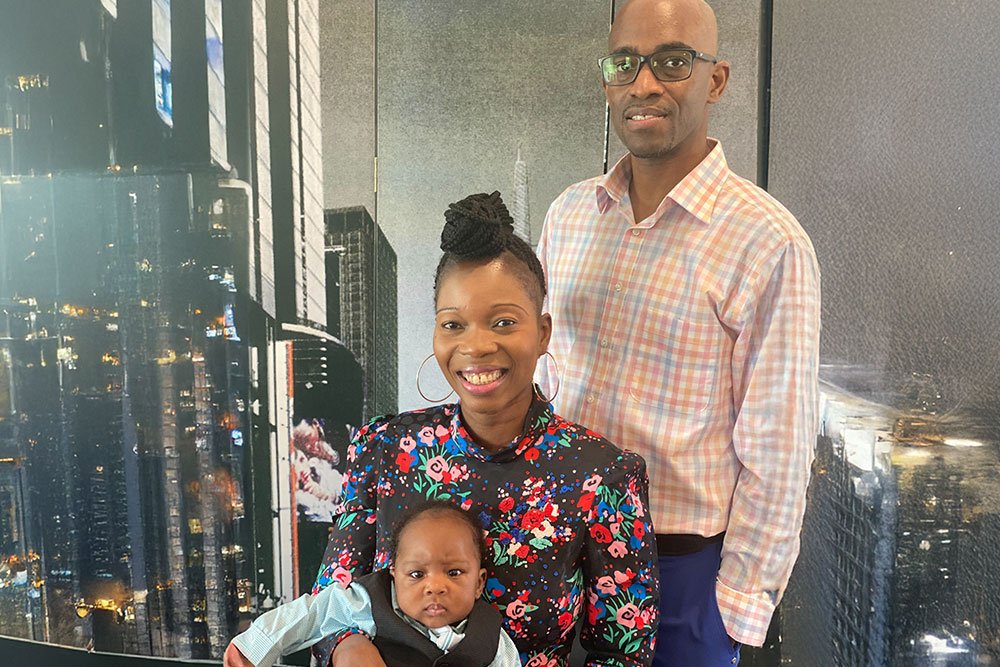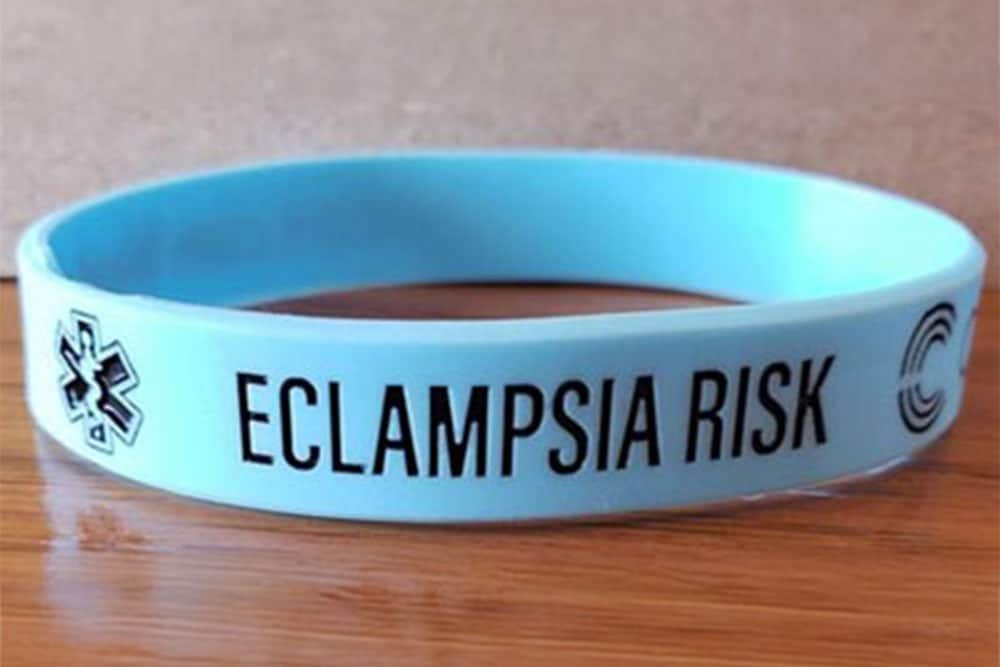Blue Bands Can Save Lives of Pregnant Women and New Moms
 Eunice Adjei-Gyimah and her fiancé, Ryan Daniel, looked forward to celebrating Independence Day with their new son Nathaniel, who had been born on June 23. All seemed to be going well for mom and baby, with Eunice getting into the daily rhythm of caring for a newborn — until Ryan found her unconscious on their bathroom floor.
Eunice Adjei-Gyimah and her fiancé, Ryan Daniel, looked forward to celebrating Independence Day with their new son Nathaniel, who had been born on June 23. All seemed to be going well for mom and baby, with Eunice getting into the daily rhythm of caring for a newborn — until Ryan found her unconscious on their bathroom floor.
The morning of July 4, Eunice had handed Nathanial to Ryan with the intention of taking a shower and freshening up. Soon after, Ryan heard moaning from the other side of the bathroom door. "I asked if everything was alright, but when Eunice didn't answer, I went in and found her unconscious and bleeding from a broken lip," Ryan said. "I was freaking out, wondering what could be going on."
When paramedics arrived on the scene, they found Eunice incoherent, kicking, screaming and sweating and Nathaniel in tears. After checking Eunice's vitals, they realized her blood pressure was quite high.
Unknown to Eunice, she had preeclampsia, which is chronic or new onset high blood pressure that develops during pregnancy or up to six weeks after delivery. It affects up to 10% of expectant mothers and is responsible for 10-15% of all maternal deaths in the U.S. And it affects minorities disproportionately. In fact, preeclampsia is 60% more common in black women than white women, according to 2014 HealthCare Cost Utilization Project data.
Once at the hospital, Eunice's blood pressure spiked again to 240/90. "I was scared," Ryan said.
I had friends and family in New York who died of preeclampsia. I thought ‘this can't be happening to us, please God, please God, don't make this happen.' I knew every moment could be life or death.
— Eunice Adjei-Gyimah
Fortunately, with the right treatment, Eunice started to improve, but not before spending a week at CentraCare - St. Cloud Hospital. Two of those days were in the Intensive Care Unit with staff trying various medications to try and get her blood pressure under control.
 Due to situations like this, CentraCare Nurse Provider Melissa Bray-Erickson, RNC, brought the Blue Band Initiative to Minnesota. This effort works to improve awareness and recognition of preeclampsia within our communities. As part of this project, patients at risk for preeclampsia receive a blue wristband from their doctor. Melissa hopes that if people see someone with a blue wristband experiencing a medical problem, they will tell medical staff — speaking up can affect treatment options and health outcomes. Without proper treatment, preeclampsia can lead to stroke, seizure, organ damage or death.
Due to situations like this, CentraCare Nurse Provider Melissa Bray-Erickson, RNC, brought the Blue Band Initiative to Minnesota. This effort works to improve awareness and recognition of preeclampsia within our communities. As part of this project, patients at risk for preeclampsia receive a blue wristband from their doctor. Melissa hopes that if people see someone with a blue wristband experiencing a medical problem, they will tell medical staff — speaking up can affect treatment options and health outcomes. Without proper treatment, preeclampsia can lead to stroke, seizure, organ damage or death.
Symptoms of preeclampsia can mimic other conditions making it hard for medical staff to recognize them — especially if the woman is not obviously pregnant or unable to verbalize her medical history. Some symptoms of preeclampsia include swelling, headaches, vision changes, nausea, weight gain, trouble breathing, chest pain and confusion.
 Nathaniel enjoys first snowfall
Nathaniel enjoys first snowfall
"After Nathaniel was born, I noticed I had swollen feet and hands," Eunice said. "But since he was my first baby, I thought this was normal or due to having a C-section."
Eunice definitely thinks a blue band, especially after delivery, would help medical staff. "When you call 911, medical staff go through scenarios ‘a', ‘b' and ‘c,' " she said. "But if they see a blue band, they could save time and jump right to protocol ‘b' instead of starting from ‘a.' "
Ryan agreed and said that the blue bands could help providers start a preeclampsia conversation at prenatal visits and set the standard of care. "Blue bands don't pick or choose; they just happen. Once you know a patient is in a high-risk category, you check the boxes, you get this blue band and you wear it for the life of your pregnancy, plus six weeks after delivery."
 Pilot Nathaniel's first Halloween
Pilot Nathaniel's first Halloween
For Melissa, she hopes this initiative gives health care workers a better understanding of the subtle signs and symptoms of preeclampsia. "It's important women of all backgrounds get similar treatment and care," Melissa said. "I would love to see this program spread across the Midwest."
Eunice is now back home and feeling good. Ryan is thankful. "It was fortunate I was home that day. Just the day before, I was at Target for an hour picking up baby supplies. Imagine if I was gone and Eunice was by herself? The result might have been different. I hope the blue band initiative can help future mothers be on the lookout for this silent killer."